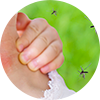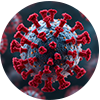
A repellent is a chemical that repels unwanted insects. By using a repellent for mosquitoes, ticks, flies and others, it is possible to prevent not only a number of unpleasant bites, but also diseases that these insects transmit (eg Lyme disease, malaria, yellow fever, dengue fever). They work on the principle of masking body odor, at the same time they are unpleasant for insect olfactory cells.
We most often encounter repellents in the form of sprays or sprays. Gels, creams, sticks, bracelets, etc. can also be used. It is usually applied directly to the skin or clothing.
The repellent does not remain active throughout the day, so it is necessary to repeat the application (according to the manufacturer's recommendations). The reliability and duration of action depend mainly on the selected concentration of the active substance. The more concentrated the substance, the longer the repellent will act (does not mean a stronger repellent effect).
In repellents intended for adults, we most often encounter a substance called DEET (N, N-diethyl-meta-toluamide). DEET repellents (up to 30 %) can also be used by children from 2 years of age, breastfeeding and pregnant women.
The disadvantage is a clear odor and the possibility of damaging synthetic substances, plastics, painted or varnished surfaces, rubber and also leather.
This substance should be relatively safe if the application instructions are followed. A combination of repellent and insecticide is also possible.
Pyrethroids (permethrin, deltamethrin) - insecticides, ie. substances that kill insects. They are usually part of repellents intended for clothing, footwear, tents, etc. Due to toxicity and suspected carcinogenicity, permethrin is replaced by deltamethrin (higher effectiveness against insects at lower concentrations).
The active substance in repellents intended for children (possibly individuals with sensitive skin, pregnant and lactating women) is most often one of the following substances:
Lower irritation is expected while maintaining comparable repellent properties as DEET.
Another option is to use natural repellents containing strongly aromatic substances (eg menthol, camphor, geraniol, etc.). Rosemary, lavender, mint, lemon grass, nutmeg, tea tree, etc. have a repellent effect. They are usually available in the form of bracelets or patches. The disadvantage is the short-term effect.
So we always choose suitable clothes and closed shoes for nature. The larger the body, the less insects have a chance to attack. When you return, it's a good idea to see it.
Freely according to the ČLnK web portal for the public Lékárnické drops, 16.6.2022

30. 11. 2025
The pitfalls of mail order dispensingAt the recent XXXIVth congress of delegates of the Czech Chamber of Pharmacists, the discussion about the possibility of introducing mail order dispensing was reopened ...

31. 10. 2025
Hepatitis A (viral hepatitis A) is an infectious inflammatory liver disease caused by the hepatitis A virus. It is transmitted by the fecal-oral route either by ...